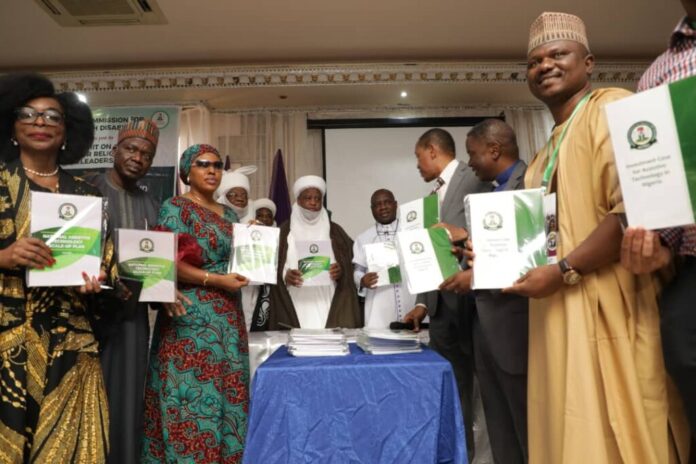On the 7th of December 2022, the National Commission for Person with Disabilities (NCPWD), hosted the 2nd National Summit on Disability Inclusion for Religious and Traditional Leaders in Nigeria (2022) at the Sandralia Hotel, FCT, Abuja. This event was supported by Sightsavers, Global Disability Inclusion, Save the Children, Disability Rights Fund, Christian Blind Mission, and The Leprosy Mission of Nigeria. The summit was organized with the objective of raising awareness amongst traditional leaders in the country regarding the key role they play in the strive for the promotion and inclusion of people with disabilities (PWDs) in all spheres of the society. Recall President Muhammadu Buhari signed into law the Discrimination Against Persons with Disability (prohibition) Act in January 2019.
To commence proceedings, in his welcoming speech, the Executive Secretary of the NCPWD, Hon. James Lalu, expressed his gratitude towards all stakeholders present at the summit, acknowledging them for all their efforts and contributions in the disability space. Thereafter, His Eminence Alhaji Muhammadu Sa’ad Abubakar, Sultan of Sokoto, followed up by emphasising the responsibility and the role religious and traditional institutions play in alleviating all forms of stigma and discrimination towards PWDs in Nigeria.
“We all worship somewhere. If not in the church, it is the mosque…and we listen to our religious and traditional rulers. So, we want them to assist us in addressing the issue of stigma and discrimination – His Royal Eminence Alhaji Muhammadu Sa’adu Abubakar, Sultan of Sokoto.”
After the Keynote Address by Hon. Sadiya Farouq of the Federal Ministry of Humanitarian Affairs, Disaster Management and Social Development, the summit provided moved into the session for the NCPWD to officially launch the National Assistive Technology Scale-Up Plan and the Investment Case for Assistive Technology in Nigeria that it had developed with support from Clinton Health Access Initiative (CHAI) with technical contributions from other development partners, MDAs and CSOs.
For context, the government through the Federal Ministry of Humanitarian Affairs, Disaster Management and Social Development and in collaboration with CHAI conducted Nigeria’s first ever Assistive Technology Country Capacity Assessment Report. Key findings from the assessment revealed that Nigeria lacked robust and reliable data on AT and on disabled persons generally. It also flagged that a unified national strategy for increased access to AT does not exist and the legal framework for the procurement and purchase of AT needed strengthening. To this end, the National Assistive Technology Scale-Up Plan was developed to provide a road map for the effective and efficient scale-up for universal access to quality and affordable AT. On the other hand, the Investment Case for Assistive Technology in Nigeria was developed to illustrate the economic, educational, health and social benefits of widespread access to AT in the country.
All the stakeholders present at the event reiterated the need for key AT stakeholders across the country to come together to discuss and voice their opinions over the best practices for the revered traditional leaders and institutions to adopt for the promotion and inclusion of people with disabilities (PWDs) in all spheres of the society, especially, at the desired equitable access to affordable and quality assistive devices, irrespective of where they may be living. In addition, the summit granted the NCPWD the opportunity to showcase the enormous progress that has been made by the Hon. James Lalu-led administration at the policy level to enhance the quality of lives of persons with disabilities and expressed the commitment of the commission to do even more in similar regard.


